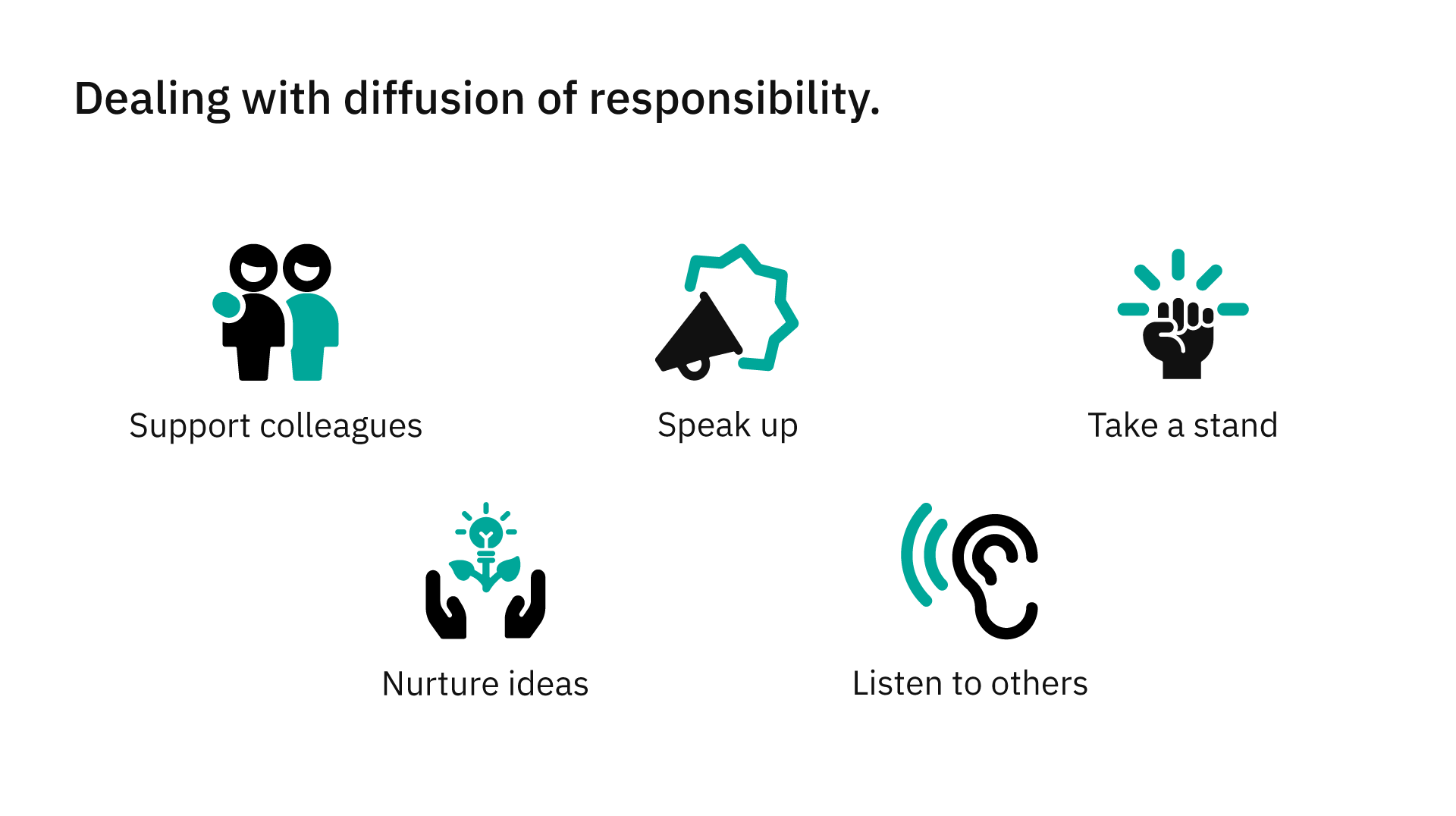
Diffusion of responsibility. - Fighting prejudice series
Updated on October 16, 2024
Ever found yourself in a situation so sticky, you caught yourself thinking "surely, someone else will deal with it"? Or, picture this, you're walking down a bustling street, and you spot a piece of litter but don’t pick it up. The thought crosses your mind, “Isn’t that what street cleaners are for?” If this sounds familiar, congratulations, you've just encountered diffusion of responsibility, a problematic behavior that tends to emerge in a crowd.
In today’s blog, we're diving deep into what diffusion of responsibility really means. We'll provide examples, dissect its importance, and explore effective strategies for overcoming it. This phenomenon isn't just something trivial. It's a critical issue in society that affects how we interact with people around us. How we respond to situations that require us to do something. Whether it's a minor issue like littering or more severe incidents that require immediate action, doesn’t matter. Understanding and addressing diffusion of responsibility are the main things for creating a proactive and supportive workplace. So, let’s not wait around for someone else to make the first move. Let’s jump right in, because if we don’t tackle this issue head-on - who will?
What is diffusion of responsibility?
Diffusion of responsibility is a thing that occurs when individuals in a group or crowd don’t feel like they have to take action or take responsibility for something. The reason for this is because they believe that others around them will do something. This concept is closely related to the bystander effect, where the presence of people around us discourages an individual from intervening in an emergency situation. All because they feel somebody else will do it.
For example, if you’ve ever lived in a dorm or had multiple roommates, you know how inactivity about cleaning can go out of control. One of you left a couple of dishes in the sink. Each one of you passes the sink multiple times a day and nobody cleans the dishes. Before you know it, there’s more dishes in the sink. The problem here is that you know that cleaning isn’t only your responsibility - but your roommates think the same thing. “I’ll let them do it.” leads to a mess.
Why is it important in the workplace?
In the workplace, diffusion of responsibility is a crucial concept to grasp because it can really have an impact on how you and your colleagues function. It affects everything from productivity to morale. When people see unethical behavior but do not feel like they have to do anything about it, such behaviors become normal. This normalization can have a huge impact on how your workplace functions and the reputation it has.
Disparaging, hurtful or downright offensive behavior or comments may go unaddressed. For example, if one of your colleagues makes a sexist remark, and doesn’t get any negative feedback, they will continue with inappropriate behavior. At that moment people may think “This is wrong, but I don’t have to be the one to bring it up”. We would rather not subject ourselves to a moment of discomfort. So, how do we avoid diffusion of responsibility?

How to deal with it?
Proper solutions, and not just bandaids, require individual effort supported by institutions inside the company. At Transcom, we truly care about our employees feeling safe and comfortable at their workplace. That’s why we have a strong whistleblower policy, and we support our employees through HR. Making sure that people’s voices and concerns are heard and, more importantly, addressed is the key to a good work environment. All of this allows for diffusion of responsibility to be sidestepped by allowing employees to not have to get into conflicts.
On the other hand, the fostering of an inclusive and open workplace culture that sees people as equals is as important. Employees should encourage each other to speak up or stand up for those who can’t. Support can come from many different places, but if you feel alone amongst your peers all other sources may seem unimportant.
Effectively handling diffusion of responsibility in the workplace needs a strategic approach. The focus of this approach should be building support systems for people who speak up or feel targeted. Such systems nurture an environment where employees feel empowered and accountable. By fostering a culture of transparency and open communication, organizations can dismantle the barriers people feel they have in order to act. This ensures that team members feel supported. Leadership plays a pivotal role in this process, demonstrating through their actions the value of taking initiative and the importance of each contribution, no matter its size
In conclusion.
Encouraging a sense of community within the workplace, where successes are celebrated and challenges are collectively addressed, can significantly mitigate the effects of diffusion of responsibility. It's about creating a workplace where employees understand that while the responsibility may be shared, the duty to act remains personal. Implementing such support systems leads to a more engaged workforce, enhanced productivity, and a stronger ethical foundation, ultimately driving the organization towards its goals. If you want to work somewhere that makes sure your voice is heard, that you feel safe and seen - Transcom is the place to be.
